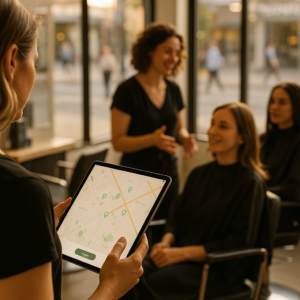Introduction
Running a restaurant isn’t just about serving delicious food—it’s about making sure people actually find you. And in today’s online world, that’s where SEO comes in. Imagine someone craving Italian food, typing “best lasagna near me” into their phone. Wouldn’t it be great if your restaurant popped up first? That’s the power of SEO. Let’s uncover the secrets that can help your restaurant stand out and bring more hungry diners to your door.
Optimize Your Website for Local Search
Think of your website as your digital menu board. When people are nearby and looking for a place to eat, they should find you easily. That’s where local search optimization comes in.
Quick Wins for Local SEO:
- Include your full name, address, and phone number (also called NAP) on every page. It’s like telling Google, “Hey, this is where I am—send people my way!”
- Have a “Contact Us” page with a clear map and driving directions.
- Use keywords like “best seafood in Dublin” naturally in your content.
And here’s a pro tip: Make sure your NAP details are consistent across the internet. Even a small inconsistency can confuse search engines.
Focus on Mobile Optimization
Here’s the thing: Most of us grab our phones when we’re looking for a place to eat. If your website isn’t mobile-friendly, you’re losing diners before they even see your menu.
How to Be Mobile-Ready:
- Speed is everything. A website that takes more than 3 seconds to load? That’s a no-go.
- Keep it simple. Menus, contact buttons, and reservation forms should work smoothly on small screens.
- Add a click-to-call button. Why make people copy your number when they can call you with a tap?
Google loves mobile-friendly sites, and so do your potential customers. It’s a win-win.

Leverage Google My Business (GMB)
If you’re not using Google My Business, you’re missing out. GMB is like a free billboard for your restaurant, right on Google’s search results.
How to Stand Out on GMB:
- Upload drool-worthy photos of your dishes and your cozy restaurant vibe.
- Keep your hours, address, and phone number up-to-date.
- Respond to reviews—both good and bad. It shows you care.
When someone searches for “family-friendly restaurants in Dublin,” your GMB profile is what they’ll see first. Make it count!
Use Keywords Strategically
Keywords are the magic words that connect your restaurant to searchers. But it’s not about stuffing them everywhere—it’s about using them naturally.
Examples of Restaurant Keywords:
- “Best rooftop bar in Dublin.”
- “Gluten-free pizza near me.”
- “Romantic dinner spots downtown.”
Think about what your ideal customer might type into Google. Sprinkle those phrases into your homepage, menu pages, and blog posts.
Gather and Highlight Customer Reviews
We all love a good recommendation, right? Reviews are like word-of-mouth marketing, but online. They don’t just influence decisions; they also boost your SEO.
How to Get Great Reviews:
- Ask happy diners to leave a quick review on Google or Yelp.
- Add a QR code to your receipt that links to your review page.
- Respond to reviews, even the not-so-great ones. Show you’re listening and improving.
Great reviews don’t just attract more customers—they tell search engines your restaurant is legit.

Create High-Quality Content
Content isn’t just for bloggers—it’s a powerful tool for restaurants, too. Think of it as a way to keep your website fresh, and your diners engaged.
Content Ideas That Work:
- Share your chef’s favorite recipes (without giving away all the secrets).
- Post stories about your ingredients or suppliers.
- Write about local food trends or the history of a dish on your menu.
Fun, engaging content keeps people coming back to your site—and, eventually, your restaurant.
Use Social Media to Boost SEO
Social media and SEO go hand in hand. While social platforms don’t directly impact your SEO ranking, they drive traffic to your website, which Google notices.
How to Nail Social Media:
- Share your daily specials, events, and foodie photos on platforms like Instagram and Facebook.
- Include your website link in every post.
- Encourage customers to tag you in their posts (and always repost those lovely food shots).
A strong social presence keeps your brand top-of-mind and drives diners to your door.
Optimize for Voice Search
“Where’s the best burger near me?” That’s how people search with their voices. Voice search is growing, and restaurants can benefit big time.
Voice Search Hacks:
- Use natural, conversational phrases like “top brunch spots in Dublin.”
- Add FAQs to your website answering common questions.
- Highlight features like “kid-friendly” or “outdoor seating.”
Voice search connects you with customers looking for answers at the moment.
Add Schema Markup for Better Visibility
Ever wonder how some restaurants get those fancy star ratings or menu previews in search results? That’s schema markup at work.
What Schema Can Do for You:
- Highlight your customer reviews.
- Show off your menu items directly in search results.
- Display business details like hours, reservations, and special deals.
Schema markup helps your listing stand out, which means more clicks—and more diners.
Track Your SEO Performance
SEO isn’t a “set it and forget it” kind of thing. You need to keep tweaking and improving.
How to Stay on Top of It:
- Use Google Analytics to see how people are finding your site.
- Check your GMB insights to track calls and directions.
- Adjust your keywords and content as search trends evolve.
Keeping an eye on your progress ensures all your efforts are actually paying off.

Conclusion
SEO might seem like a lot of work, but it’s worth it. By focusing on these tactics, you can attract more diners, boost your online presence, and grow your restaurant business. Whether it’s optimizing your website, engaging on social media, or collecting reviews, every small step makes a difference.If it feels overwhelming, don’t worry—Elites Algorithm is here to help. We specialize in SEO strategies tailored for restaurants so you can focus on what you do best: serving amazing food.
FAQs
Why is SEO important for restaurants?
SEO makes it easier for people to find your restaurant online. It’s especially helpful for local searches like “restaurants near me.” With the Elites Algorithm, you can maximize your SEO potential.
How can I get more customer reviews?
You can ask happy diners directly or include a review request on your receipts. Responding to reviews also encourages more people to leave feedback.
What is schema markup, and why do I need it?
Schema markup helps search engines display extra details about your restaurant, like reviews or menus. It makes your listing stand out in search results.
Does social media really help with SEO?
Indirectly, yes. Social media drives traffic to your website, which can boost your SEO ranking over time.
How does the Elites Algorithm help restaurants with SEO?
Elites Algorithm provides customized SEO strategies for restaurants. From keyword research to performance tracking, we handle the technical stuff so you can focus on running your business.





